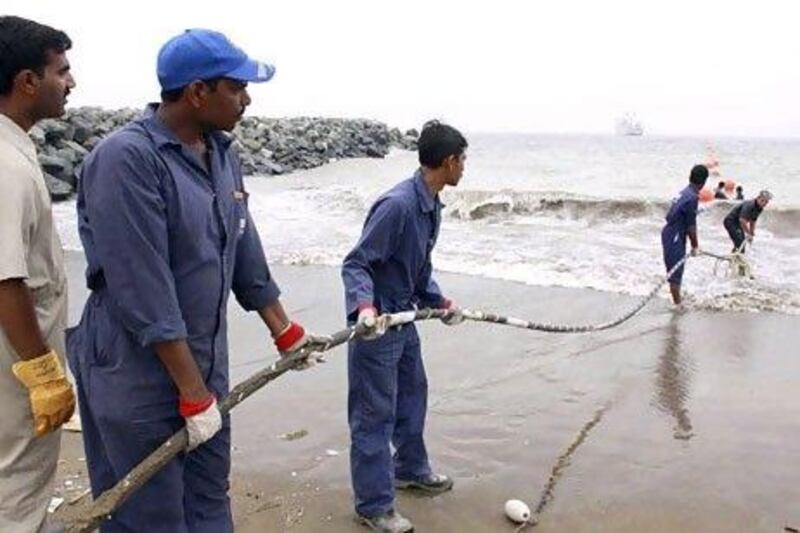More must be done to protect undersea cables, which are “indispensable” to the global economy but are “highly vulnerable” to attack from countries such as Russia, Iran and China, a new report warns today.
While the idea that steel and plastic pipes are integral to our life seems anachronistic in this age of cloud computing, “nothing could be further from the truth”, states the report by British think tank Policy Exchange.
Physical pipes, lying deep beneath the ocean, are the “jugulars of the world economy”, writes Rishi Sunak, Conservative MP and the author of the report. 97% of global communications and $10 trillion in daily financial transactions are transmitted not by satellites in the sky, but by undersea cables.
But despite this dependency, security remains a challenge, the report warns.
Undersea cables are “inadequately protected and highly vulnerable to attack at sea and on land, from both hostile states and terrorists”, the think tank says. Their exact locations are isolated and publicly available, making them “a singularly attractive target for our enemies”.
In particular, the report warns that Russia, Iran and China could all look to pipes on the ocean floor as potential “asymmetric targets”.
_______________
Read more:
[ New submarine cables to bring faster internet to UAE ]
[ Shortage of undersea cables keeps broadband pricing high ]
_______________
US intelligence officials have already flagged Russian submarines “aggressively operating” near Atlantic cables as part of its broader interest in unconventional methods of warfare, the think tank says. When Russia annexed Crimea, one of its first moves was to sever the main cable connection to the outside world.
In his foreword to the report, Admiral James Stavridis, US Navy and former NATO supreme allied commander, says that over the course of his career, he has seen the Atlantic Ocean “transition from being a theatre characterised by near complete NATO supremacy to a space that Russia is actively contesting through a resurgent naval doctrine”.
He adds: “If the relative weakness of the Russian position makes a conventional conflict with NATO unlikely, it also raises the appeal for them of asymmetric targets like fibre optic cables.
“We should prepare for increased maritime hybrid activity, not just from Russia, but also from China and Iran.”
Since the first trans-Atlantic cable was laid in 1858, cables have mainly been installed and owned by private companies. Although positive for taxpayers, this has meant undersea cables do not get the attention from governments they deserve, the report observes.
The landing sites where undersea cables come ashore are particularly at risk of attack. These sites, which are situated in just a few remote, coastal locations, are “critical national infrastructure but often have minimal protection, making them vulnerable to terrorism”.
A foiled Al Qaeda plot to destroy a key London internet exchange in 2007 illustrates the credibility of the threat, the report says. Should such an attack succeed, it would be “an existential threat to our security”.
The report comes at a time when Britain's defence spending is at risk, with the Ministry of Defence bracing itself for more deep cuts in the army, navy and air forces following a major national security review.
A band of former soldiers-turned-MPs within the Conservative party have united in a public push to oppose any further cutbacks, arguing that post-Brexit Britain should be spending more on defence, not less.
Mr Sunak, who is the MP for Richmond, said that undersea cables must not be forgotten as the country re-evaluates its defence spending.
“As we debate our future defence priorities, protecting the freedom of the seas and all the lanes of communication on and under them is paramount,” he said.
“Britain and our NATO allies must ensure that our maritime capabilities get the investment they need.”
The report, which has been endorsed by several senior officials including Admiral Stavridis, Robert Hannigan, former security adviser to the prime minister and director of GCHQ until earlier this year, and General Lord Houghton, former UK chief of defence staff, makes several recommendations to improve the security of the pipes under the sea.
It urges the next strategic defence and security review to specifically address threats to Britain’s security from attacks on its undersea cable infrastructure. There should also be a review of UK landing sites where cables come ashore, in order to improve security. The government should also work with private communications companies to install more backup ‘dark cables’ and improve monitoring at sea.
Citing the example of Australia and New Zealand, the report suggests establishing “Cable Protection Zones” around the highest value communications corridors.
It also calls on Britain to lead efforts to develop a new international treaty to protect undersea cables.





